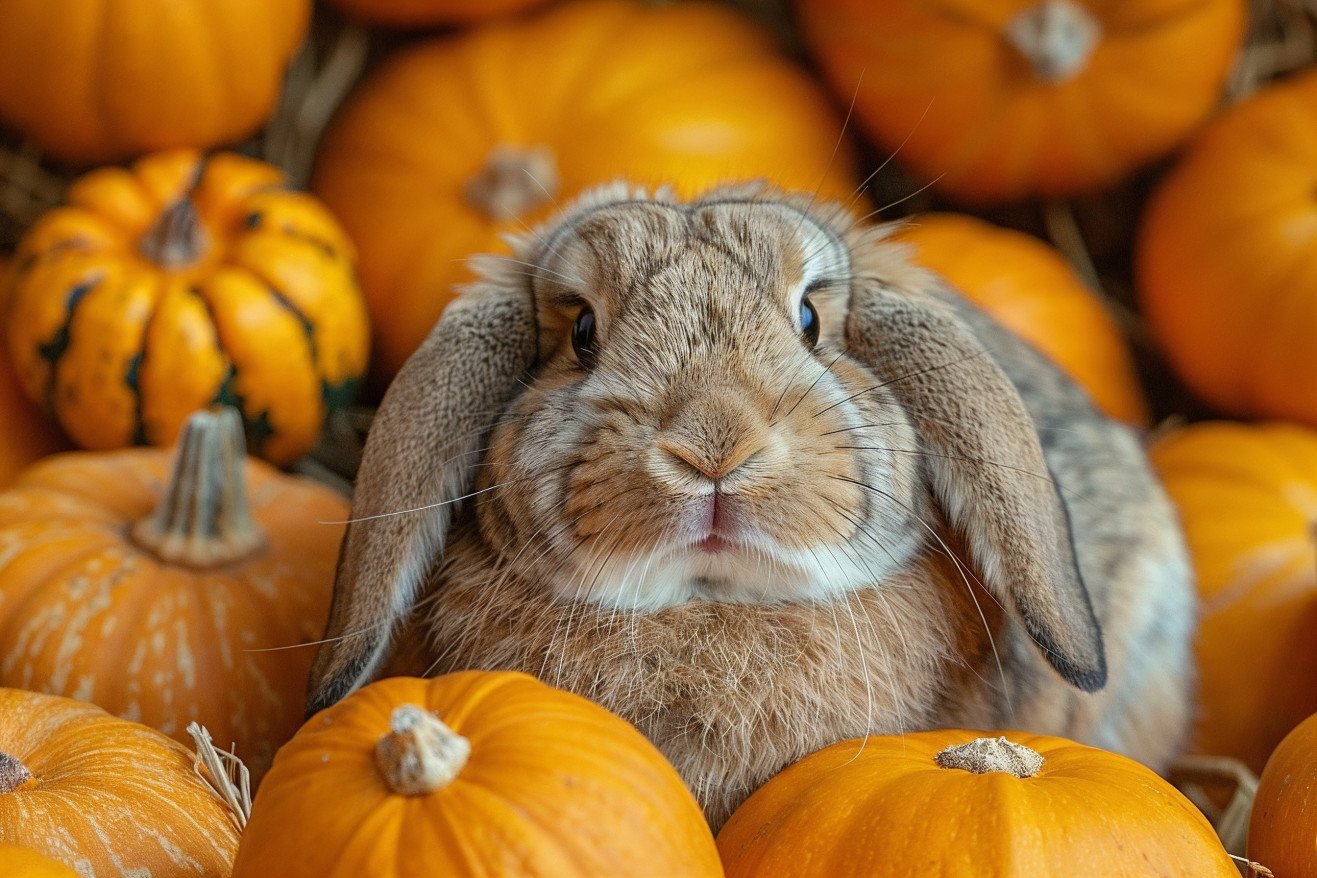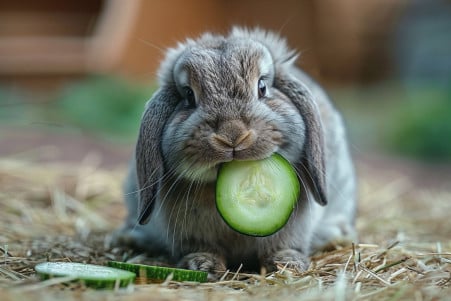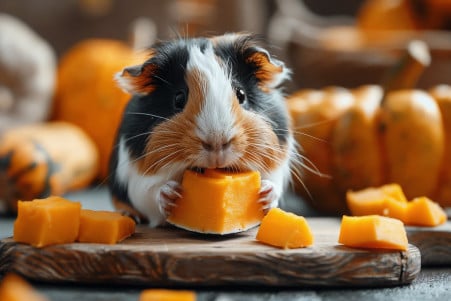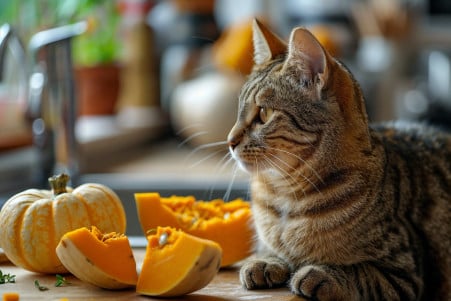Can Rabbits Eat Squash? A Detailed Guide to This Crunchy Vegetable
2 April 2024 • Updated 1 April 2024

With its popularity in backyard gardens and its vitamin-packed meat, it’s no wonder that rabbit owners are curious about whether or not it’s safe and healthy to feed their pets squash. The good news is that rabbits can eat squash! Most types of squash, including the meat and the skin, are high in fiber, vitamins A and C, and antioxidants that are good for rabbits when they’re fed to them as part of a well-rounded diet.
To help you better understand how to feed your rabbit squash, we’ve researched information from veterinary nutritionists and rabbit experts. In the following sections, we’ll talk about which types of squash are best, how to prepare squash for your rabbit, how much squash to feed your rabbit based on their age and breed, and how to tell if you’re feeding your rabbit too much squash. This information will help you make an informed decision about whether or not the benefits of feeding your beloved rabbit squash outweigh the potential downsides.
Can rabbits eat squash?
Types of Squash: Which Are Safe for Rabbits?
The most common types of squash, including zucchini, butternut, acorn, and pumpkin, are safe for rabbits to eat in moderation. According to PetCosset, these squashes are also packed with important nutrients like vitamin A, fiber, and calcium, which can help support a rabbit's health and development.
On the other hand, it's important to steer clear of feeding rabbits ornamental squash types and wild squashes, which may contain toxins that could be dangerous to your pet. To be safe, only feed your rabbit squash that you've purchased from a store.
Different types of squash have different nutritional values, so it can be helpful to rotate the types of squash you offer your rabbit to make sure they get a variety of vitamins, minerals, and antioxidants. For instance, butternut squash is high in vitamin A, while zucchini is a good source of vitamin C.
If you're feeding your rabbit a type of squash for the first time, it's best to start with a small amount and watch your pet closely for any signs of digestive upset, such as diarrhea or a lack of energy. If your rabbit tolerates the squash well, you can gradually increase the portion size. However, if you're considering feeding your rabbit a type of squash that you're not familiar with, it's a good idea to ask your vet or check reputable online sources to make sure it's safe and suitable for your pet.
How to Prepare: Preparing Squash for Your Rabbit
When preparing squash for your rabbit, make sure to wash it thoroughly to remove any dirt, pesticides, or other harmful substances. Rabbits for Sale notes that the skin and seeds can be left on most squash types for adult rabbits, but you should remove any fibrous parts.
For the healthiest way to serve, Rabbit Food Runner suggests cutting the squash into small, bite-sized pieces to avoid any choking hazards. In general, cooked squash is better and easier for rabbits to digest than raw squash, but make sure not to add any seasonings or oils to the squash.
If you’re feeding your rabbit squash for the first time, VCA Animal Hospitals explains that you should start with small amounts and increase the serving size as your rabbit gets used to the new food. This will help you avoid any digestive issues, such as gas or diarrhea.
Squash for Baby Bunnies: When Can You Start Feeding Your Rabbit Squash?
Since baby rabbits have very delicate digestive systems, it is recommended that you not feed them squash or any other solid food until they are at least 5-6 months old, according to The Educated Rabbit. Instead, you can start by feeding them small amounts of leafy greens that are easy to digest, like romaine, cilantro, and parsley. Make sure to watch your baby bunny for any signs of digestive issues, like diarrhea or lethargy, and adjust the amounts as needed.
You can slowly add more variety and volume to your baby rabbit's diet as they get older and more used to eating solid foods. Oxbow Animal Health suggests feeding your rabbit 3 to 5 different types of greens and veggies each day, making sure to rotate them so that your rabbit gets a good mix of nutrients. If you want to know more about when you can start feeding your baby rabbit solid foods, you should ask your vet.
How Much Squash Can Rabbits Eat?
Because of its higher carbohydrate and lower fiber content compared to hay and leafy greens, squash should be given to rabbits in limited amounts. Pet Keen suggests that the general rule for non-leafy vegetables like squash is 1 tablespoon per 2 lbs of body weight per day.
For dwarf breeds and rabbits that weigh less than 5 lbs, Best Friends Animal Society suggests a daily serving of 1 cup of fresh vegetables, including squash. For larger rabbits, the organization recommends up to 2 cups of fresh vegetables, including squash.
To avoid obesity and other health issues, make sure to keep an eye on your rabbit's weight and adjust the amount of squash you give them as needed. Arizona Exotics notes that fruits and non-leafy vegetables should be limited to 1 tablespoon per 2 lbs of body weight per day.
Squash in a Balanced Diet: Incorporating Other Essential Nutrients
While squash can offer rabbits important nutrients, it's important to remember that it should not be the main component of their diet. According to Rabbit.org, a rabbit's diet should mainly consist of unlimited hay, a small portion of high-fiber pellets, and fresh water. In addition to squash, it's important to offer rabbits a variety of leafy greens and other vegetables to make sure they have a well-rounded diet.
As BeChewy explains, the majority of a rabbit's vegetable intake should be leafy greens and herbs, with non-leafy vegetables like squash being fed in moderation. Fruits can also be given as treats in small amounts, but they should not replace the essential hay, pellets, and vegetables.
For help in making sure you're offering your rabbit a balanced and nutritious diet, it's best to talk to a veterinarian or another reputable source. PDSA notes that it's important to offer a variety of foods to make sure your rabbit gets all the nutrients they need. By combining squash with other healthy foods, you can make sure your rabbit has a well-rounded and satisfying diet.
Conclusion: Squash as a Healthy and Fun Rabbit Treat
Squash can be a healthy and nutritious option for rabbits if it’s introduced and fed in the right way. Popular types of squash like zucchini, butternut, and pumpkin are packed with fiber, vitamins, and antioxidants. However, it’s important to prepare and serve squash correctly, control portion sizes, and introduce it slowly to avoid causing digestive problems.
Squash should be part of a well-rounded diet that also includes hay, pellets, leafy greens, and other vegetables. When used correctly, squash can be a fun and healthy way to treat your pet rabbit.


